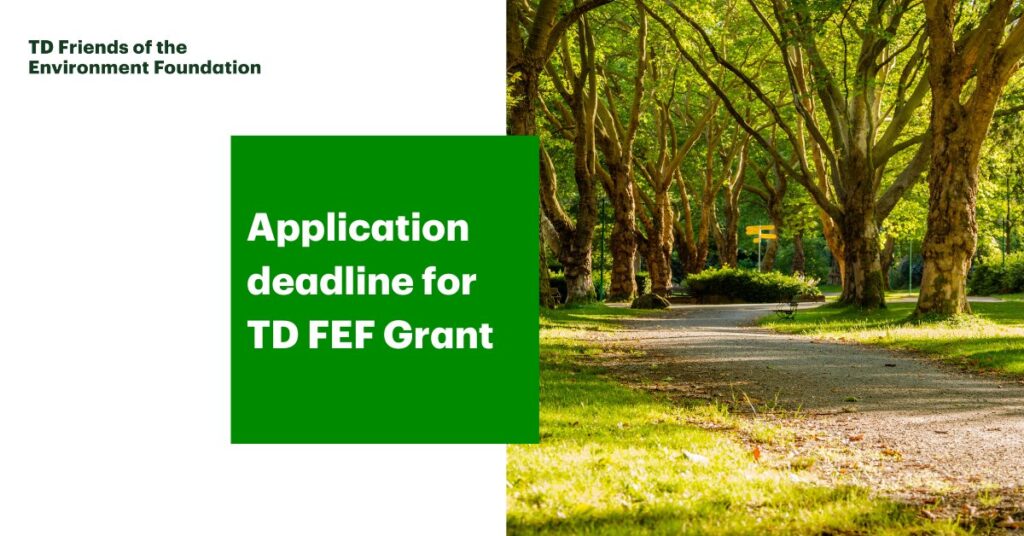
Deadline: 15-Jan-25
Applicants are now invited to submit applications for TD Friends of the Environment Foundation Grant to help protect the environment and green communities across Canada.
Contents
The Foundation supports a wide range of environmental initiatives, with a primary focus on environmental education and green space programs.
Funding Information
- The majority of TD FEF grants are between $2,000 and $8,000.
Ineligible Expenses
- Infrastructure and capital costs (sheds, solar panels, low flush toilets, water refill stations, etc.)
- Administrative, contingency funds, or operating expenses
- Shade structures (gazebos, pergolas, shade sail, built structures, etc.)
- Playground equipment (traditional play structures)
- Ornamental landscaping or beautification
- Conferences
- Land acquisition
- Expenses related to advocacy activities (i.e., campaigns, protests, etc.)
- Projects occurring on private land with no public access
- Scholarships, grants or bursaries
- Awards and prizes
- Mileage, accommodation, meal costs or other travel expenses
- Expenses incurred prior to the application date
- Venue rentals
- Projects taking place outside of Canada
- Research projects
- Pesticides for any purpose
Eligible Projects
- Eligible projects include schoolyard greening, park revitalization, community gardens, park programming and citizen science initiatives.
Eligibility Criteria
- Organizations eligible to receive funding:
- Registered Canadian charities with a Charitable Registration Number (CRN)
- Educational institutions (primary/secondary/post-secondary)
- Municipalities
- Indigenous groups/communities
Specific Criteria
- Community Gardens
- Community Garden projects need to contain a focus on at least one environmental issue in order to be eligible for funding. The application also needs to address the following questions:
- How is your organization addressing an environmental issue?
- Who is engaged in the project (local schools, Indigenous groups/communities, seniors, families, general community etc.)?
- Is there an educational or workshop component?
- Will the garden be accessible to people with disabilities or limited mobility?
- How will you engage the community?
- If associated with a school, how will the garden be maintained over the summer months? What is the maintenance plan?
- For new gardens, does your organization have permission to use the land?
- If planting vegetables, how will the crops be used?
- Community Garden projects need to contain a focus on at least one environmental issue in order to be eligible for funding. The application also needs to address the following questions:
- Environmental Education Projects
- Environmental Education projects should contain a focus on local environmental issues and identify why it is important to educate the public. For school projects, the project should focus on information that is appropriate to the target audience combined with a ‘hands-on’ educational component or workshop. If the project involves planting, gardens or any physical alterations to school grounds, the application must be submitted by the school. In the application please address the following questions:
- For school projects, are there curriculum ties? If so, in what subjects?
- If the applicant is an environmental organization presenting to the school, please include confirmation of participation from the school(s).
- How does the education initiative support the teachers involved (if applicable)?
- What are the goals of the educational program? Is there any follow up with the participants following the activities?
- Is the education about environmental issues that are relevant to the local community?
- For community education projects, explain why it is relevant to the community
- Environmental Education projects should contain a focus on local environmental issues and identify why it is important to educate the public. For school projects, the project should focus on information that is appropriate to the target audience combined with a ‘hands-on’ educational component or workshop. If the project involves planting, gardens or any physical alterations to school grounds, the application must be submitted by the school. In the application please address the following questions:
- Outdoor Classroom and Nature Play
- Outdoor classroom and nature play projects should demonstrate a strong connection to environment and provide students with opportunities for environmental learning. If the project includes play elements, TD FEF will prioritize those that use natural materials in providing age-appropriate environmental learning opportunities to young children.
- Applicants should consider the following questions:
- How is the school and possibly community involved in building the outdoor classroom? Will there be a dedicated space for learning activities?
- If your project includes natural play elements, please provide information on how you will include learning connections to nature and the environment.
- How is your project encouraging environmental connection for children that may not otherwise have access to nature play?
- Are there changes being made to the school grounds? If yes, school board approval is required.
- What courses/workshops will the outdoor classroom host? How will teachers be encouraged to use the space?
- Will there be a planting component to the outdoor classroom? If so, how will the plantings be maintained over the summer months?
- How will the outdoor classroom be shared with the community?
- Tree Planting and Greening Projects
- For tree planting and greening projects, there should be a focus on engaging the community as volunteers and on planting native species. Applicants should address the following questions:
- Where is the planting taking place? Why is the project needed at this point?
- Who is involved in planning the project and in carrying out the planting?
- How will the organization engage the community?
- Please provide a plant list in your application detailing what native or non-native plants will be used and why (e.g., increase pollinators, provide shade, etc.)
- Who owns and/or manages the property? Has the organization obtained permission to plant?
- How will the site/trees be maintained?
- For tree planting and greening projects, there should be a focus on engaging the community as volunteers and on planting native species. Applicants should address the following questions:
For more information, visit TD.




